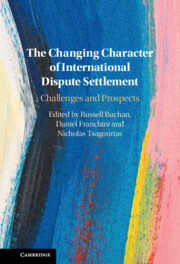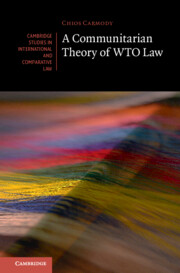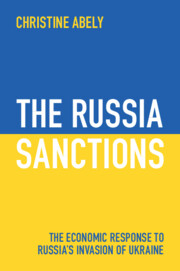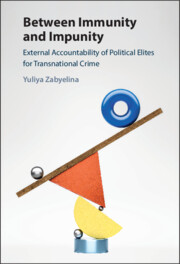52113 results in International relations and international organisations
10 - Enforcement
-
- Book:
- The Russia Sanctions
- Published online:
- 14 December 2023
- Print publication:
- 21 December 2023, pp 101-110
-
- Chapter
- Export citation
7 - The Role and Legitimacy of International Human Rights Mechanisms of Dispute Settlement
- from Part II - Effectiveness, Authority, and Legitimacy of the Current System of International Dispute Settlement and Possible Reforms
-
-
- Book:
- The Changing Character of International Dispute Settlement
- Published online:
- 14 December 2023
- Print publication:
- 21 December 2023, pp 184-216
-
- Chapter
- Export citation
Acknowledgments
-
- Book:
- A Communitarian Theory of WTO Law
- Published online:
- 14 December 2023
- Print publication:
- 21 December 2023, pp xiv-xviii
-
- Chapter
- Export citation

Turkey in the Global Economy
- Neoliberalism, Global Shift and the Making of a Rising Power
-
- Published by:
- Agenda Publishing
- Published online:
- 20 December 2023
- Print publication:
- 10 December 2020

Outside the EU
- Options for Britain
-
- Published by:
- Agenda Publishing
- Published online:
- 20 December 2023
- Print publication:
- 06 October 2020

Negotiating Our Economic Future
- Trade, Technology and Diplomacy
-
- Published by:
- Agenda Publishing
- Published online:
- 20 December 2023
- Print publication:
- 20 October 2020
Transitioning Guerrillas: An Analysis of the Internal Cohesion of the Former FARC in Their Transit from War to Democracy
-
- Journal:
- Latin American Politics and Society / Volume 66 / Issue 3 / August 2024
- Published online by Cambridge University Press:
- 15 December 2023, pp. 79-106
-
- Article
-
- You have access
- HTML
- Export citation
Partisan Stereotyping and Polarization in Brazil
-
- Journal:
- Latin American Politics and Society / Volume 66 / Issue 2 / May 2024
- Published online by Cambridge University Press:
- 15 December 2023, pp. 47-71
-
- Article
-
- You have access
- Open access
- HTML
- Export citation

The Changing Character of International Dispute Settlement
- Challenges and Prospects
-
- Published online:
- 14 December 2023
- Print publication:
- 21 December 2023

A Communitarian Theory of WTO Law
-
- Published online:
- 14 December 2023
- Print publication:
- 21 December 2023

The Russia Sanctions
- The Economic Response to Russia's Invasion of Ukraine
-
- Published online:
- 14 December 2023
- Print publication:
- 21 December 2023

Between Immunity and Impunity
- External Accountability of Political Elites for Transnational Crime
-
- Published online:
- 14 December 2023
- Print publication:
- 21 December 2023
Abbreviations
-
- Book:
- China's Gambit
- Published online:
- 30 November 2023
- Print publication:
- 14 December 2023, pp xiii-xiv
-
- Chapter
- Export citation
Acknowledgments
-
- Book:
- China's Gambit
- Published online:
- 30 November 2023
- Print publication:
- 14 December 2023, pp xi-xii
-
- Chapter
- Export citation
Copyright page
-
- Book:
- China's Gambit
- Published online:
- 30 November 2023
- Print publication:
- 14 December 2023, pp iv-iv
-
- Chapter
- Export citation
7 - Conclusion
-
- Book:
- China's Gambit
- Published online:
- 30 November 2023
- Print publication:
- 14 December 2023, pp 189-200
-
- Chapter
- Export citation
4 - Sino-Japanese Disputes in the East China Sea
-
- Book:
- China's Gambit
- Published online:
- 30 November 2023
- Print publication:
- 14 December 2023, pp 97-129
-
- Chapter
- Export citation
Index
-
- Book:
- China's Gambit
- Published online:
- 30 November 2023
- Print publication:
- 14 December 2023, pp 223-231
-
- Chapter
- Export citation
Dedication
-
- Book:
- China's Gambit
- Published online:
- 30 November 2023
- Print publication:
- 14 December 2023, pp v-vi
-
- Chapter
- Export citation
1 - Introduction
-
- Book:
- China's Gambit
- Published online:
- 30 November 2023
- Print publication:
- 14 December 2023, pp 1-12
-
- Chapter
- Export citation

